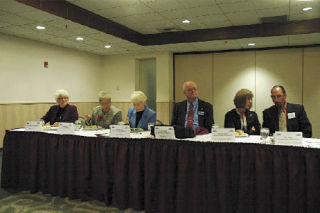SMOKEY POINT — The Arlington-Smokey Point Chamber of Commerce’s traditional Political Forum was practically overstuffed with candidates, Oct. 14.
The Hawthorn Inn and Suites hosted incumbent 10th District Democratic Sen. Mary Margaret Haugen and Republican representatives Norma Smith and Barbara Bailey, as they faced Republican challenger Linda Haddon and Democratic challengers Tim Knue and Patricia Terry, respectively. Likewise, incumbent 39th District Republican Sen. Val Stevens and Rep. Dan Kristiansen met Democratic challengers Fred Walser and Scott Olson, respectively, while 39th District Republican Rep. Kirk Pearson was unaccompanied by Democratic challenger David Personius. George Appel, candidate for Snohomish County Superior Court Judge Position Six, sat beside candidate Joe Wilson, while Mike Hope, Republican challenger for the 44th District, appeared without Democratic incumbent Liz Loomis.
Haugen began by acknowledging that voters and legislators alike face challenging times, mentioning the loss of 800 local jobs at Meridian and the billion-dollar budget cuts looming on the state’s horizon. She emphasized the need to “keep moving forward” on issues like transportation, and cited her experience in highway improvement.
Haddon described herself as “a frustrated taxpayer” who’s worked since she was 13 and owned her own business. She condemned the “debacle” of no new ferries in five years and, like many candidates who followed, she decried the state’s more than $3 billion budget deficit as the result of wasteful government spending.
Stevens introduced herself as a 30-year resident of Arlington who advocates less government intrusion and scaled-back government spending. She outlined the responsibilities of government as “enabling people to make a living” and “first, do no harm,” and stated her opposition to new taxes, and even certain existing taxes that she believes harm small businesses.
Walser believes that his 40 years of experience in law enforcement would give the legislature a valuable perspective, especially when it comes to seeing which public safety programs work and which ones don’t. He’s lobbied state and federal agencies to fix “deadly highways,” and supports education’s role in preventing crime, citing middle school drop-outs who have become delinquents.
Smith was appointed to office unanimously in January, but she believes that she’s already learned a great deal about transportation, insurance and economic issues. She represented herself as a voice of bipartisanship and fiscal responsibility, who admitted that budget sacrifices lie ahead.
Knue has worked as a high school teacher for 32 years, but in that time he’s had experience in agricultural and career and technical education issues. He echoed other candidates’ qualms with business and occupation taxes, and pointed to his successful students as evidence of his ability to lead and work with others.
Bailey, a self-described “Navy spouse,” also started work in her teen years and has owned her own company. She noted her experience in dealing with business regulations, payroll issues and living within her means. Her stated goal is to “help small businesses thrive.”
Terry began with an anecdote of meeting a voter so poor that she asked Terry to help her with her stitches, since the woman couldn’t afford to have them removed. Terry, a registered nurse, was able to direct the woman to a community center, but she pointed to such citizens as examples of how “we have a broken healthcare system.” Terry asserted that social justice and quality of life must be part of good government.
Kristiansen mentioned healthcare, taxes, employment and the economy as “big challenges,” and held up his own experiences as an employer and an employee as qualifications for office. When he repeated the other candidates’ statistic that government spending had outpaced its revenue by two and a half times, he said, “I couldn’t do that in my business.”
Olson believes that solving problems requires more than “throwing money at them,” and expressed the desire to help government work smarter, not harder, to face its budgetary challenges. While he regrets the problems caused by the deficit, he sees it as an opportunity to make government more efficient for the foreseeable future. He named the economy, education and the environment his chief concerns.
“I’ll say ditto to a lot of what everybody else here has said,” Pearson said. He assigned his highest priority to safeguarding society’s most vulnerable members, such as children, and brought up his own work to empower corrections officers to deal with sex offenders. He empathized with the laid-off employees of Meridian, but expressed hope that local businesses could bounce back, as they did in the 1980s.
Hope summarized himself as one of two sons of a divorced mother, who remembers what it’s like to be raised on a single income. He credited his service in the Marine Corps with giving him discipline, his years as a police officer with affording him the chance to see how public safety programs work in action, and his experience as a small business owner with educating him about the issues faced by other small business owners.
Marysville resident Appel has served as a deputy prosecuting attorney for 15 years and has prosecuted “every kind of crime” on behalf of “every kind of victim.” He pointed to the endorsements he’s received from police guilds and other agencies in Arlington and Marysville, and cited his record of “not shying away from the tough cases.”
Wilson’s experience includes years of practice in both criminal and civil law, including real estate, personal injury, family and estate law. His endorsements include Richard Thorpe, the incumbent of the position that Wilson and Appel are vying for, and as a result of his years of private practice, he joined the chorus of candidates who noted their experience as business owners.







